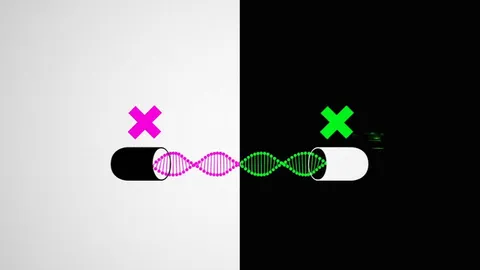The intersection of science and spirituality often evokes profound contemplation, particularly when delving into the Bahá’í teachings regarding the nature of humanity and existence. One area of burgeoning interest within the scientific community is epigenetics, a field that profoundly influences our understanding of inheritance and the profound impact of environment and experience on our genetic makeup. This emerging discipline resonates with the Bahá’í perspective, which posits that human beings are more than mere physical entities; we are also spiritual beings engaged in a continuous journey of growth and development.
Epigenetics, a term derived from the Greek word ‘epi,’ meaning ‘above’ or ‘on top of,’ encompasses the study of modifications to gene expression that occur without altering the underlying DNA sequence. These modifications, often triggered by environmental factors, experiences, and choices, elucidate a fascinating duality: while our genetic blueprint provides a foundational framework, it does not solely dictate our fate. Rather, it is a testament to the interplay between innate potential and external influences, as illustrated in various Bahá’í texts that emphasize the importance of both spiritual and material dimensions of existence.
At the heart of Bahá’í teachings is the belief that the human spirit is inherently noble. This foundational principle allows for a more nuanced understanding of our existence. The Bahá’í faith postulates that humans are endowed with spiritual capacities that extend beyond the physiological; it is this spiritual essence that informs ethical behavior, decision-making, and the pursuit of knowledge. Epigenetics corroborates this belief by suggesting that our life experiences can engender changes in our epigenome—changes that may be transmitted to future generations, indicating that our actions, values, and consciousness transcend the limitations traditionally ascribed to our physical bodies.
One compelling observation within the framework of epigenetics is the concept of environmental influence on gene expression. Behavioral and emotional experiences shape our biological makeup over time. Stress, nutrition, and exposure to toxins are mere facets of an intricate tapestry contributing to the regulation of our genes. This reality reverberates with Bahá’í teachings, which stress the impact of environment and education on personal development. The advancement of society, as articulated in Bahá’í scripture, hinges not only on physical infrastructure but also on the moral and spiritual education of its people. This symbiotic relationship is crucial in nurturing a generation that can harness its intrinsic potential for the betterment of humanity.
Moreover, the implications of epigenetics challenge reductive interpretations of human behavior. In an era where determinism often prevails, the idea that our experiences can reprogram our genetic expression invites a more holistic view of human nature. The Bahá’í Faith advocates for a perspective that sees individuals as capable of transformation through conscious decisions and transformative experiences. This transformative potential is echoed in the teachings of Abdu’l-Bahá, who famously articulated the notion that humanity is in a state of constant evolution toward a higher consciousness.
Another area of intrigue within the context of epigenetics is intergenerational inheritance. Research indicates that epigenetic changes can be passed from one generation to the next, leading to implications for understanding the continuity of trauma, resilience, and other psychological experiences. This attribution of characteristics across generations has profound implications aligned with the Bahá’í view that humanity is intricately connected. The communal aspects of the Bahá’í Faith emphasize the idea that the spiritual and moral upliftment of one generation can create a ripple effect, fostering a legacy of progress that transcends individual lives, resonating through familial lines and communities.
As the scientific discourse surrounding epigenetics continues to evolve, it remains imperative to foster dialogues that bridge spiritual understanding with empirical evidence. Bahá’í teachings encourage a harmonious coexistence of science and religion, each serving to illuminate the truths inherent in the other. The Bahá’í perspective asserts that spirituality and science are two complementary paths converging towards the same truth, further enriching our understanding of the human condition. Recognizing the complexity of evolution not only through the lens of biology but also through spiritual development allows for an enriched contextualization of human existence.
In navigating the intricate interplay between epigenetics and Bahá’í teachings, it becomes evident that our lives are not solely dictated by genetic inheritance but are dynamically shaped by our choices, environment, and spiritual commitments. Engaging actively in the development of our spiritual selves facilitates broader blossoming in both personal and collective capacities. Each individual bears the responsibility to cultivate their inner capacities, contributing to a legacy of transformation that extends beyond geographical and temporal confines.
As we contemplate the nexus of epigenetics and Bahá’í principles, we uncover the depth of our interconnectedness and the significance of conscious living. This multifaceted engagement emphasizes that while we are biochemically crafted, we are also spiritually destined to transcend limitations through our ethical engagements and interpersonal connections. The potential to reimagine our genetic legacies by nurturing a culture that respects and uplifts the spiritual and moral dimensions of existence illuminates a pathway toward a thriving society motivated by the very best of our shared humanity.
Consequently, it is crucial for contemporary society to recognize the potent implications of both epigenetics and spiritual teachings as we navigate the complexities of existence. Understanding the profound implications of our choices allows for a more expansive view of what it means to be human, affirming that we are not merely physical creatures but inherently spiritual beings, capable of transcending our biological limitations through conscious evolution and the embodiment of higher virtues.
